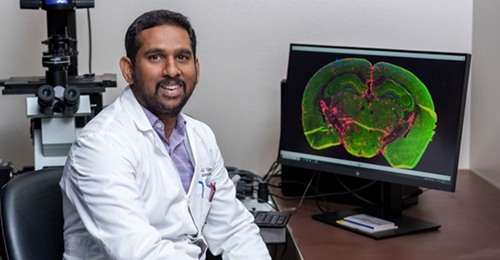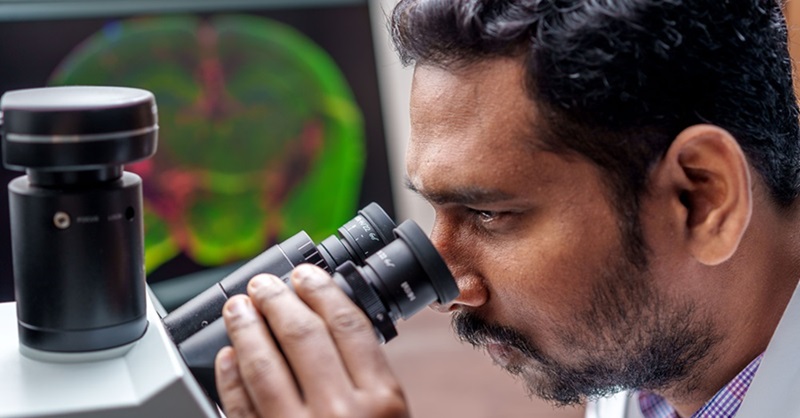TARCC, AHA Grants to Aide TTUHSC Researcher
Vijayan to study VDAC1 and mitophagy in Alzheimer’s disease

The grant will support Vijayan’s research into how VDAC1 regulates mitophagy, a critical cellular process that helps maintain healthy mitochondria by removing dysfunctional mitochondria during periods of metabolic stress.
Mitochondrial dysfunction plays a significant role in the development of Alzheimer’s disease. By studying VDAC1, Vijayan aims to uncover novel mechanisms that contribute to this dysfunction, potentially leading to new therapeutic targets. The research will involve both in vitro and in vivo models to examine how disruptions in VDAC1 function may impair mitochondrial clearance and exacerbate neurodegeneration.

“These two grants provide a unique opportunity to investigate the intersection of mitochondrial dysfunction in Alzheimer’s disease and develop innovative strategies to protect neurons and slow disease progression,” Vijayan added. “We are hopeful that our research will lead to meaningful advances in understanding and treating Alzheimer’s disease.”
Related Stories
TTUHSC Cancer Researcher Honored by National Academy of Inventors
C. Patrick Reynolds, M.D., Ph.D., director of the School of Medicine Pediatric Cancer Research Center at TTUHSC, has dedicated his life as a researcher to developing treatments for childhood cancers.
TTUHSC’s Hudson Set to Serve as President for Society of Clinical Research Associates
The Society of Clinical Research Associates (SOCRA) has elected Texas Tech University Health Sciences Center’s (TTUHSC) Catherine Hudson, Dr.P.H., as its president for 2025-2026.
Clinical Research Institute a Source of Pride for Retiring Griswold
Upon his retirement, John Griswold, M.D., reflects on the Clinical Research Institute and what it has achieved.
Recent Stories
The John Wayne Cancer Foundation Surgical Oncology Fellowship Program at Texas Tech University Health Sciences Center Announced
TTUHSC is collaborating with the John Wayne Cancer Foundation and has established the Big Cure Endowment, which supports the university’s efforts to reduce cancer incidence and increase survivability of people in rural and underserved areas.
TTUHSC Receives $1 Million Gift from Amarillo National Bank to Expand and Enhance Pediatric Care in the Panhandle
TTUHSC School of Medicine leaders accepted a $1 million philanthropic gift from Amarillo National Bank on Tuesday (Feb. 10), marking a transformational investment in pediatric care for the Texas Panhandle.
Texas Tech University Health Sciences Center Permian Basin Announces Pediatric Residency Program Gift
TTUHSC Permian Basin, along with the Permian Strategic Partnership and the Scharbauer Foundation, Feb. 5 announced a gift that will fund a new pediatric residency.
